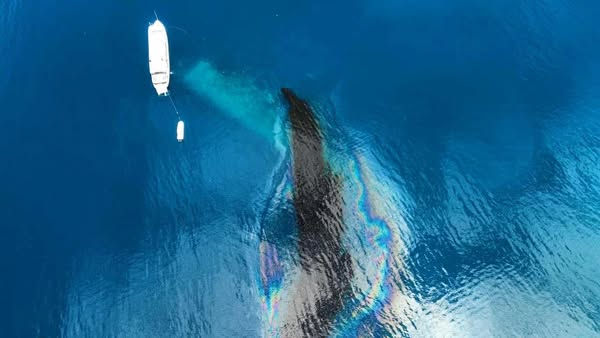State of emergency declared for Chuuk over oil leak from WWII shipwreck
- Admin

- Sep 28, 2025
- 3 min read
Updated: Sep 28, 2025

By Mar-Vic Cagurangan
Micronesian President Wesley Simina has declared a state of emergency due to toxic oil leaking from a World War II shipwreck in Chuuk Lagoon, posing significant risks to marine life, coral reefs and the nation's fishing economy.
“These remnants of war now threaten our fisheries, our communities and our livelihoods,” he said, appealing for urgent international assistance during his speech at the 80th United Nations General Assembly in New York.
“The scale of this crisis far exceeds Micronesia’s capacity to address alone. As we mark the 80th anniversary of the war’s end, we appeal to the international community to work with us in transforming this legacy of war into an opportunity for cooperation.” Simina added.
Chuuk Gov. Alexander R. Narruhn first declared a state of emergency on Sept. 15 after divers discovered oil leaking from a WWII shipwreck on Sept. 11.
Narruhn sought assistance from the U.S. and Japan as he warned residents of toxic fumes and contaminated water.
According to the International Oil Spill Organization, the leak originates from the Rio de Janeiro Maru, a Japanese vessel sunk during Operation Hailstone in February 1944, which was a significant battle in Chuuk Lagoon, and has already spread to nearby islands, including Panitiw, Nukanap and Sopota.
"The delicate marine ecosystem of Chuuk Lagoon, including coral reefs and diverse fish species, is highly vulnerable to oil pollution, and local communities, who rely heavily on reef fish and seafood, face disruptions to their food supplies and livelihoods," the organization said.
"The UN system in Micronesia is conducting a rapid assessment and working to mobilize resources for technical expertise and equipment as there is a critical need for immediate international action to contain the spill, secure emergency funding for cleanup, and conduct risk assessments of all other high-risk wrecks," it added.
Oil leak from sunken ships is a persistent threat to marine life in the Pacific Ocean.
In 2022, the Secretariat of the Pacific Regional Environment Program reported that there were over 1,200 potentially polluting shipwrecks in the Pacific Ocean, many from WWII.
The bulk of this wreckage is concentrated in Chuuk Lagoon, resulting from Operation Hailstone in February 1944, a destructive three-day U.S. attack that sank over 50 Japanese warships and supply ships.
SPREP has partnered with the Australian government and the Major Projects Foundation to enhance efforts to address the risks to human health and safety, and to the environmental and economic security of nearby Chuuk communities, posed by the oil spills.

At the general assembly in New York, Simina highlighted other challenges facing the Pacific island region.
“For Micronesia, the impacts are constant—king tides, storms, droughts, saltwater intrusion and shifting rainfall that devastate our 607 islands,” Simina said. “In 2024, severe droughts forced us to declare a state of emergency, showing how quickly circumstances can turn dire at the frontline of this crisis.”
He urged world leaders to match science with action, stressing that small island nations are living the climate crisis daily.
Simina pushed for methane mitigation as a global priority, warning that “cutting methane now could slow ocean heating and buy us time to build the clean energy future.”
He announced FSM's plan to launch a new Nationally Determined Contribution and Methane Roadmap at COP30.
“But no country can meet this challenge alone,” he said. “These commitments require solidarity.”
He also reaffirmed Micronesia’s fight against plastic pollution and called for a strong global treaty covering the full lifecycle of plastics. “Despite the failure of the INC to produce a plastics treaty in Geneva, we are not giving up,” he said.
Simina also renewed FSM’s call for a Fossil Fuel Non-Proliferation Treaty and welcomed Colombia’s invitation to host the first international conference on the equitable phase-out of fossil fuels. “To keep 1.5 alive and secure our survival, we must act now—for today, and for all generations to come,” he said.
Subscribe to
our digital
monthly edition






